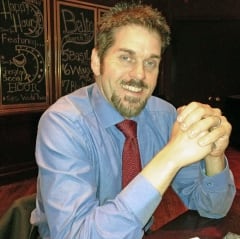source GAIA package: Sx_MilitaryTimes_M6201410306260080_5675.zip Origin key: Sx_MilitaryTimes_M6201410306260080 imported at Fri Jan 8 18:18:17 2016
Jason Heap submitted an application last year to achieve a personal goal that would also make history: Become the Navy's first humanist chaplain.
But this spring, the secular acolyte got a rejection letter.
The letter from the Navy's chief of chaplains office did not explain its ruling. The rejection has raised concerns from atheist organizations as to whether the Navy spiked his application because he doesn't believe in a god.
"I wouldn't want to speculate," said Jason Torpy, an Army vet and president of the Military Association of Atheists and Freethinkers, in a June 18 phone interview. "But I can't think of another reason."
Navy officials declined to address individual applications per privacy laws but said religious designation isn't grounds for denying an application.
Still, Heap's proponents believe he would have been a shoo-in — if not for his atheistic belief system.
Heap, 39, attended Brite Divinity School at Texas Christian University, then earned a master's degree in ecclesiastical history from the University of Oxford in England. He's been living in the United Kingdom since 2001.
He could not be reached for comment, but provided a statement through a spokeswoman.
"I am exceptionally disappointed and aggrieved by the Navy's initial rejection of my application," he wrote. "I will continue to seek acceptance. I hope military leaders will open their hearts to humanists and give me the opportunity to serve all sailors as a chaplain for the next 20 years or more."
Recognizing religions
There is "huge" need for humanist chaplains in the Navy, Torpy said. According to a 2013 Pentagon survey, more than 13,000 service members identify as atheists or agnostics; humanism was not a choice on the questionnaire.
As a policy, the Chaplain Corps does not consider an applicant's religion when making admission decisions. As long as a person is endorsed by a religious organization, the chief of chaplains policy director said, they meet the minimum qualifications to apply.
Still, officials were unable to say whether the Navy's policy considers humanism a religion, making it possible this raised questions that led to Heap's rejection.
Current Navy chaplains have been endorsed by 107 religious organizations, the vast majority being Protestant. Groups range from the International Church of the Foursquare Gospel to the Buddhist Churches of America.
"The religious organizations that endorse Navy chaplains expect their chaplains to provide religious ministry to those of the chaplain's own faith group and for the chaplain to make arrangements for others to have their religious needs met," Chaplain (Capt.) Jim Denley told Navy Times.
As a corps, Denley said, chaplains are expected to minister to their own faith group, connect sailors with other chaplains or groups who better suit their needs, provide confidential counseling to all and advise commanding officers.
Chaplains are trained to counsel sailors as they come, honoring their religious backgrounds and belief structures. A Presbyterian chaplain may end up counseling a Jewish sailor, for instance, if they decide it's beneficial.
"It might be best to say that we're discussing the 'art' of chaplaincy," Denley said. "Navy chaplains are expected to know the limits of their ability to assist people of other faith groups, based on the issue presented to the chaplain."
If a chaplain doesn't feel he's the best person for the job, he'll refer the sailor to a colleague who's a better fit, spiritually speaking.
Is humanism a religion?
So, is the military open to appointing a humanist chaplain?
Earlier this year, the Army approved humanism as a religion for soldiers — they can print it on their dog tags and have in it their record for end-of-life and burial arrangements.
But the steps for adding new orders to the Navy are less clear and will be made on a case-by-case basis, officials said.
With Heap's pedigree — including experience as a Methodist minister in Texas — secular organizations rushed to endorse his bid.
On June 10, the Openly Secular coalition sent a letter to the Navy's chief of chaplains, Rear Adm. Mark Tidd, asking him to reconsider Heap's application.
"Not only does this decision fail to meet the high standards, ethical traditions and storied history of our armed services, but — simply put — it is wrong," wrote Todd Stiefel, a representative for the group.
The Navy has acknowledged the receipt of the letter, Torpy said, but has not issued a response.
Given the Navy's population of nonbelievers, advocates like Torpy demand the Chaplain Corps endorse nontheist groups, with recommendations from chaplains themselves or with meeting space facilitated by the chaplain's office.
"That means the chaplains should be trained to talk about these beliefs, provide a space to meet like they do for other groups, advertise those services alongside other services," Torpy said.
Chaplains already do that to the best of their ability, countered one Navy official who asked to remain anonymous to share his opinion and who added that there is confusion in the Chaplain Corps about what humanism really means.
"Humanism's not a defined term across the country," the official said. "There's a group of Jewish Humanists. The Humanist Society was once the Humanist Society of Friends, a Quaker organization."
The official, referring to Heap, continued: "I don't know that he represents a religious organization by any accepted definition."









